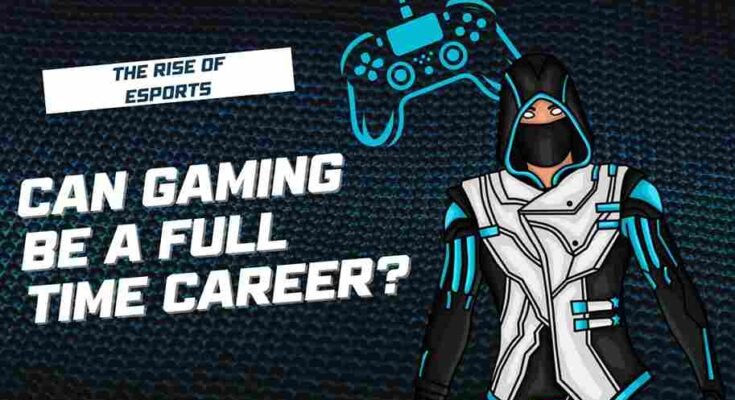So, let’s start our today’s article about The Rise of eSports: Can Gaming Be a Full-Time Career?
Moving on to the last ten years. The thing that was referred to at one point as a hobby. Or a teenage addiction has turned into an international sensation. eSports, or electronic sports, are sweeping. The world off its feet. The tournaments have attracted millions of viewers; now, prize pools are substantial, and e-athletes have reached. A level of status comparable to that of celebrities in conventional sports. When gaming has entered the market. With this kind of momentum. we are left to ask one urgent question Can gaming. As an occupation ever become a full-time job? Now, let us see more about. The development of eSports, and what it takes to enter the professional coaching. How much money a gamer can earn, what difficulties it.
The Progress of Gaming to eSports:
Gaming has changed through the long years of playing games alone. At the arcade to TGAs (Tight Games Arena) games online which are very competitive. The emergence of the internet connection, streaming media, and powerful consoles led to the emergence of a new aspect, competitive multiplayer gaming.
Esports is a term defining competitive video games. Played in a multiplayer setting. Games as League of Legends, Counter-Strike: Global Offensive (CS: GO), Dota 2, Fortnite, or Call of Duty have huge communities and properly organised leagues. The tournaments are also played at a live moment. As there are commentators, analysts, and even passionate fans. As it is in football or cricket.
The number of prizes that were awarded in the International tournament. Which was hosted by Dota 2 to nearly 2.8 million in the year 2013.
Worldwide Reach and Popularity:
It is all in the figures:
- Newzoo estimates that there will be 532 million global eSports viewers in 2022.
- Asia, especially South Korea and China, take the lead, and Europe and North America are not far behind.
- Streaming services such as Twitch, YouTube Gaming, and Kick have enabled players and teams to communicate with fans 24 hours a day.
- The legitimacy has been achieved as major brands such. As Coca-Cola, Red Bull, Intel, and Nike are currently sponsoring eSports teams and events, investing in the sector.
Even Universities are catching up, providing eSports scholarships, gaming arenas and eSports Varsities.
Who are professional gamers?
A pro-gamer is a person who earns money from playing or creating content related to video games. There are two types of them.
1: Professional Gamers:
The players are organised and participate in tournaments and leagues. They train hard (up to 812 hours a week), meet with coaches, and attend boot camps before major events.
2: Creators / Streamers:
Many talented players choose the entertainment pathway. Which includes broadcasting and streaming on Twitch or recording YouTube videos showcasing games. Others attain household names by their personality, ability, consistency or a visible talent. Examples are Ninja, Pokimane and PewDiePie (but do not count as eSports).

What is the Way for ESports Players to Earn Money?
And just as conventional athletes, professional gamers have several sources of income:
1: Tournament Winnings:
There are prizes of millions of dollars at major tournaments. The best competitors or teams can gain millions of dollars per year.
2: Brand Deals and Sponsorships:
Players and teams are paid to advertise products by brands. For example, a team can be sponsored. By a company for headsets, keyboards, or a set of energy drinks.
3: Streaming Revenue:
Networks such as Twitch enable viewers to monetise via subscriptions, donations, advertisements and sponsorships.
4: YouTube Advert incomes:
Videos uploaded to YouTube by gamers can be monetised. By Google AdSense and even through partnerships.
5: Organisational salaries:
The largest eSports organisations, such as TSM, Fnatic, and FaZe Clan, can offer players monthly salaries. That exceed tens of thousands, and in some cases, up to $25,000.
6: Merchandising:
Star players and game teams market branded items, including hoodies and game gear.

Is it possible to become a full-time gamer?
Yes, but it’s not easy. Just as up-and-coming sports stars do, success. Is only possible with the top 1 per cent getting into the big leagues. Nevertheless, it is rather possible to find a lot of working opportunities in gaming besides playing:
1: Professional Player:
It will require an exceptional skill, lightning-fast reactions and immense knowledge in the game. Initially play ranked matches then join local. Or online tournaments and get a team.
2: Streamer/Content Creator:
This can also be a good career to pursue. As long as you are charismatic, consistent, and skilled. Lots of creativity on a part-time basis and develop an audience.
3: Analyst or Coach:
The best eSports teams recruit coaches and data analysts to enhance their results.
4: Esports Journalist/Host:
It requires tournaments, writers, and interviewers. Who write about tournaments and players.
5 :Game Tester or Game Developer:
The experience in gaming can transition to careers in game design, development, or testing.
Skills and Requirements:
Gaming Skills: Manual skill, planning and versatility.
Communication: Team games or streaming in particular.
Consistency: Working in the game, making progress, and drawing conclusions about defeats.
Tech Savvy: Learn about your machines, your settings, and performance aids.
Branding: A personal image, quality of content, and interaction are essential.

Problems in the eSports Industry:
Even as the potential is not to be sneered at. The process is not a piece of cake.
1 :Burnout and Psyche:
Many players work under high pressure. Training for numerous hours to hone their skills. Such injuries as carpal tunnel syndrome. Sleep disorders and mental fatigue are common.
2: It has a short career span:
Similar to athletic abilities, gaming skills decline as one gets older. A significant number of professionals have to switch to coaching. Or streaming even at the beginning of their mid-to-late 20s.
3: Financial Instability:
Only the very best can secure large sums of money. Achieving sustained profitability in small games. Or regions can be challenging, as many have struggled to do so.
4: Toxic Communities:
Online harassment is more than likely trolling or sexism towards the players, particularly women. Who stream their game or players of minority races.
5: Uncertain Industry:
Platforms, games, and sponsorships fluctuate. The popularity of the game in the present may be gone next time.
The Education and Support Role:
Gaming has a growing value in more schools:
- Game sports organisations and college programs are sprouting around the world.
- Colleges and universities have implemented degree programs in fields related to eSports. Such as game design, marketing, and digital media.
- The attitudes of parents and society are changing. As they realise that computer games can be productive, not just a waste of time.
It is always a good idea to have an alternative plan even. When the industry is at its infancy.
The eSports of the Future:
In the long-term perspective, the trend of eSports does not decrease:
- Asian and Latin America are overrun by mobile eSports (such as PUBG Mobile, Free Fire).
- Both VR and AR would transform. How eSports is played.
- International-level participation in the Olympic Games is being realised. ESports participated in the Asian Games 2022 and are possibly headed to other Olympics.
Typical sports team owners, celebrities, and tech giants have been joining the fray as. They invest in it, which is an indication of long-term development.

Behind the Scenes of the eSports Ecosystem: The Way the Industry Works:
When considering whether gaming can be a full-time job. One should look beyond the view of players and tournaments. The esports industry has formed a complex network. With many layers of personnel and organisations. What if we simplify it in terms?
1: Teams and organisations:
The players in professional games are seldom activated alone. They often work within an organised team or gaming organisation. Just like sports franchises. These organisations operate in the following manner:
- Recruitment and sourcing of the best workforce
- Recruiting coaches, analysts and psychologists
- Process of sponsorships, merchandise and branding
There are FaZe Clan, Team Liquid, and T1. Competing in various titles. They typically have a social media department. A production department, and a sales team.
2: Game Developers and Publishers:
Game creating companies are also another essential element in developing. The eSports environment. Developers often:
- Official leagues (such as the LCS of League of Legends by Riot Games)
- Competitive rules and patch updates Set
- Offer prizes or reward the sponsors.
- Sell off licenses to other parties to host events.
Esports games, such as Overwatch, Valorant, and Dota 2, researchers can attribute. A significant part of their success to developer and financial support.
3: Tournament Organizers:
The developers do not conduct every competition. Worldwide events are organised independently. By such organisers as ESL, Blast Premier, and DreamHack, which deal with:
- Venue management
- Team coordination
- Streaming and broadcasting
They are regularly characterised. By extensive stage designs, audience presence, and a multi-day format – some even multi-city or multi-continental.
4: Streaming and Television Services:
Before making any changes to the gameplay. It is worth considering the importance of. How eSports content can be delivered. There are also exclusive streams to watch some games.
Behind the camera, casters, analysts, hosts, and production teams coordinate to provide a professional viewing experience, just. As in the case of traditional sports broadcasts.

5: Sponsorship and Advertising Companies:
The popularity of eSports is the main reason. Why brands are heavily invested in it, due to its high-value demography, mainly Gen Z and Millennials. Marketing agencies help make sponsorship deals happen. In matches between brands and players, teams, or events.
Some of these purchases involve:
- Labelled clothes and equipment
- Livestream logo placements
- The collaborations of products and co-branded campaigns
This income supports teams, rewards players and improves the level of the content.
6: Regulatory Authorities and Association:
Although esports remains fragmented in most parts of the world. Efforts are being made to regulate and formalise the industry. The goal of organisations such as the International. ESports Federation (IESF) and other regional organisations is to:
- Standardisation of the rules of the tournament
- Enhance anti-cheating and ensure fair play.
- Both individual players’ rights and the transparency of contracts are essential.
The industry is still young, and by becoming more professional. One hopes that there will be less exploitation and a healthy career may be achieved.
Realising that the eSports ecosystem is much larger than many people imagine one must appreciate that the industry offers numerous career paths, including not only players but also broadcasters, developers, marketers, legal counsellors, and event organisers. This sound engineering is the reason why gaming is a legitimate business and not just a hobby.
Conclusion: Is Gaming Just a Dream Job?
Yes, gaming can be done full-time, indeed but it is not the ticket to wealth. It requires talent, hard work, and planning, as well as some luck, just like any other profession in the entertainment or sports business. The industry is rapidly developing, so there are several positions besides playing itself, including content creation, coaching, development, marketing, and event management.
Nonetheless, a would-be gamer ought to:
Take gaming as a profession.
Create a good online presence.
Purchase quality equipment
One should be prepared to change and adopt new games.
Have a realistic perspective of rivalr.y
When pursued intelligently, eSports has the potential to be more than a job—it is being pinpointed as one of the few careers that takes passion and turns it into a career in the digital-first space.
The end of our today’s article about The Rise of eSports: Can Gaming Be a Full-Time Career?



